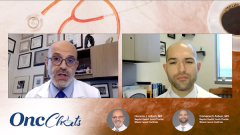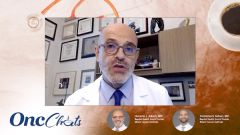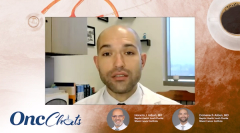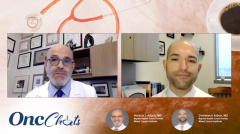
Mapping Progress in Pancreatic Cancer Surgery: Minimally Invasive Approaches
In this first episode of OncChats: Mapping Progress Made in Pancreatic Cancer Surgery, Horacio J. Asbun, MD, and Domenech Asbun, MD, discuss recent advances made in the surgical field and beyond for pancreatic cancer, including the benefits of minimally invasive approaches.
Episodes in this series

In this first episode of OncChats: Mapping Progress Made in Pancreatic Cancer Surgery, Horacio J. Asbun, MD, and Domenech Asbun, MD, both of Baptist Health South Florida, discuss recent advances made in the surgical field and beyond for pancreatic cancer, including the benefits of minimally invasive approaches.
HA: Good afternoon. Thank you for having us. It is a pleasure for me to be here. My name is Horacio Asbun. I’m the chief of hepatobiliary and pancreas surgery at Miami Cancer Institute. It is particularly my pleasure because I’m having a conversation with someone who I [have] known for several years. I have witnessed him grow and become a phenomenal surgeon, which is not that common. I feel fortunate to have Domenech Asbun [here with me today]. Domenech?
DA: Thank you very much for the very kind introduction. My name is Domenech Asbun. I am also a hepatobiliary and pancreatic surgeon at Miami Cancer Institute. I specialize primarily in cancers of the hepatobiliary tract, pancreas, and the upper gastrointestinal tract. I’m excited to be speaking with you today about some of the more recent updates in these fields.
HA: Thanks, Domenech. Starting off today, tell us a little bit about how we have evolved over the past few years in the treatment of cancer of the liver and pancreas.
DA: That’s a good question, and a loaded question. You and I are surgeons; we both love to operate, but I think we both have to admit that a lot of the changes that we have seen have come from outside of the operating room. The advances in chemotherapy—not just the agents that are used, but the timing; molecular profiling and subsequent actionable treatment plans based on those results; immune therapy; [and] other adjunctive treatments, such as radiation, electroporation, or other modalities, have all given patients in this somewhat varied class of cancers, a lot more hope than they may have had a few decades ago.
One of the other improvements we’ve also seen, inside the operating room, are advances in how we approach the operation, particularly [with] minimally invasive surgery. You are a pioneer in this field. You’ve been doing this for over 2 decades, back when most people had no idea that it was even a possibility to do some of these procedures in a minimally invasive fashion. And so, from your perspective, how is it that we’ve progressed, and what changes are you happy to look back on right now?
HA: Well, the big change came even a little bit before that time, when the mortality and morbidity of the major pancreatic procedure, the Whipple procedure, had decreased significantly. Prior to my time, the mortality was [around] 40%, and that has changed little by little by doing more hemostasis, meaning less blood loss, and trying to do a little bit more delicate surgery. Around 20 years ago—if we talk about all pancreas surgery, it’s probably 27 or 28 years—we started doing the Whipple laparoscopically. At the beginning, it was not widely accepted. It took, I would say, over a decade for other people to really be open to the idea that this was something that could be done and could be [more widespread]—especially now, with the introduction of [robotic surgery].Currently, we have a significant number of surgeons doing it.
But what is the attraction? As you understand, Domenech, when we’re doing a complex procedure such as this, trying to shorten the hospital stay by a day or trying to [give] the patient a smaller incision is not as important as when you’re talking about cholecystectomy or when you’re talking about adrenalectomy because the patient will stay in the hospital for 5 days anyway because of the complexity of the procedure. I think the important part is that we have learned a lot more about anatomy. We have seen the area in different angles, we have been able to understand that minimally invasive surgery [leads to] less blood loss, because if not, the view gets fogged. If that’s the case, then we realize, why is it that in open surgery, we lose more blood than laparoscopic? I feel that the minimally invasive access approach for pancreas surgery has helped us become much better surgeons.
In terms of the perioperative experience for the patient, that’s [where there is a need for] a smaller incision; patients can get out of bed sooner. We also added the Enhanced Recovery [After Surgery] protocols. For colleagues who are not familiar with those terms, we all know that traditionally, people couldn't eat or drink past midnight prior to surgery, and that's all gone now. In fact, we realize that patients arrive to the operating room dehydrated if you do that. We give them high carbohydrate drinks up to 4 hours before the surgery, as long as they are clear liquids. We get them out of bed and walking the same day of surgery. We don't use nasogastric [NG] tubes, or I should say, we use NG tubes sparingly. Besides that, we give all the other medications that you are familiar with, Domenech, in terms of anti-inflammatories and prokinetic agents prophylactically before the surgery. All that has translated to a much better, much more enhanced experience for the patient who is undergoing these very complex procedures.
Check back next Wednesday for the next episode in this series.









































